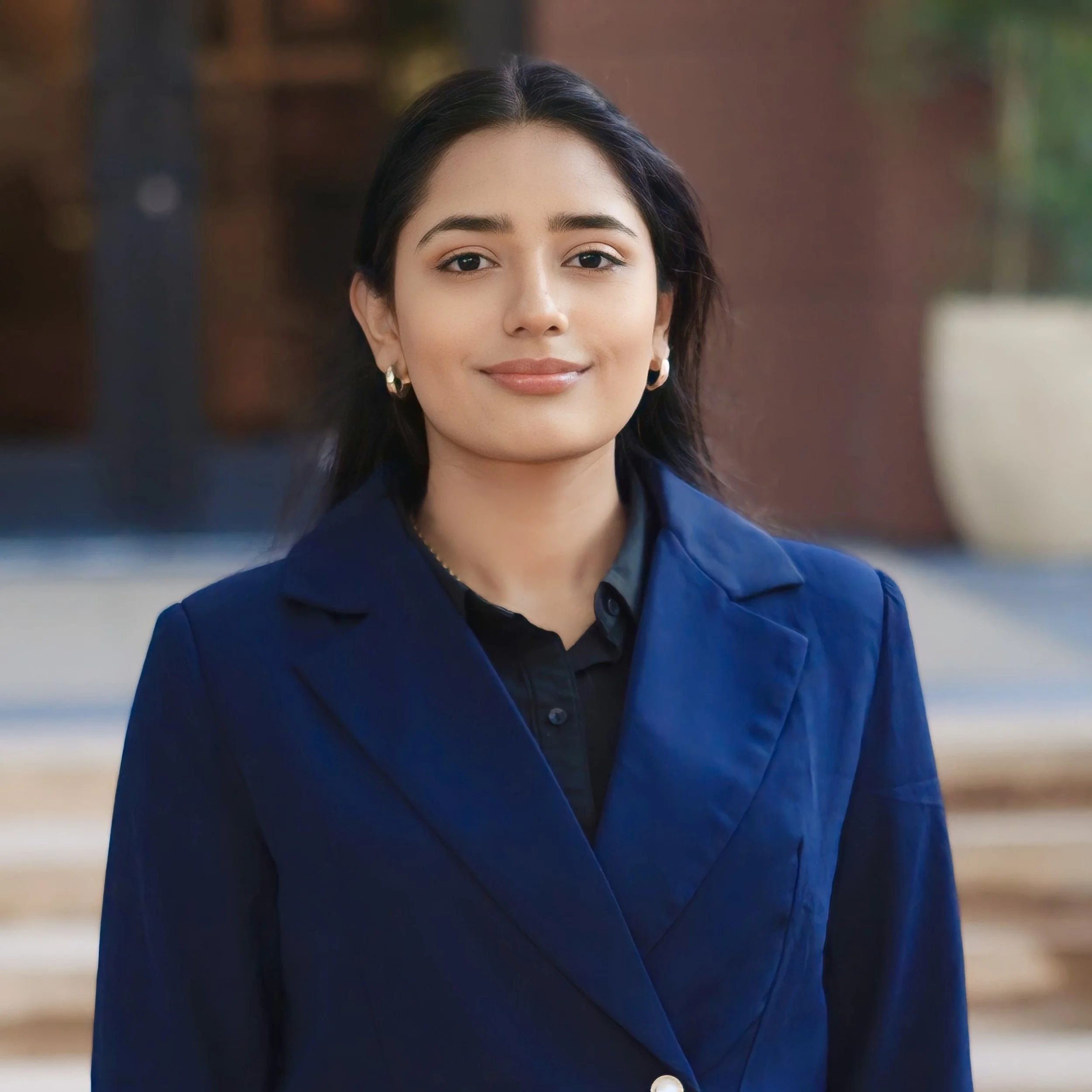our team
Brendon Davis
President
Brendon is a Ph.D. Candidate in the Cellular, Molecular, and Developmental Biology and Biophysics (CMDB) program at the Krieger School of Arts & Sciences of Johns Hopkins University. Brendon's research focuses on stem cell epigenetics, specifically histone dynamics during DNA replication and the epigenetic mechanisms that specify cell fate during stem cell division. In addition to his research, Brendon is interested in bioethics conversations surrounding the use of novel genetic and stem cell treatments, as well as federal and local policy to support foundational research and improve environmental sustainability. Prior to enrolling at Johns Hopkins, Brendon received bachelor's degrees in biology and mathematics from the University of Washington, where he was a Mary Gates Research Scholar.
Brendon is also on the leadership board of symBIOsis, providing biology graduate students with academic and professional development, and he assists with scientific outreach projects to students in Baltimore public schools through the BioEYES Project. He additionally organizes high-profile scientific speaker visits as part of the Thomas Hunt Morgan Lecture Committee. In his free time, Brendon enjoys powerlifting, traveling, reading, and petting his two cats.
John Soltis
Vice President for Science Policy
John is a Lasker Postdoctoral Fellow at Space Telescope Science Institute, researching machine learning applications to astronomy. He received a PhD in astronomy and astrophysics from Johns Hopkins University in 2025. John has advocated for better science policy in a variety of ways, including by participating in multiple Congressional Visit Days. He has worked with the American Astronomical Society, the Institute for Electrical and Electronics Engineers (IEEE), and the Johns Hopkins Science Policy and Diplomacy Group. John is also a co-author on International STEM Graduate Students: A Key to Strengthening the American Economy and Building Competitiveness, published in the Journal of Science Policy and Governance. As Vice President of Science Policy, John hopes to continue advocating for robust science funding, STEM-related immigration reform, and to aid the professional development of other PhD students who are interested in science policy.
Lucie Dequiedt
Vice President for Science Diplomacy
Lucie is a Ph.D. candidate in the Department of Chemical and Biomolecular Engineering at the Johns Hopkins University Whiting School of Engineering. Her doctoral research is focused on leveraging advanced computational methods in 3D digital pathology, with a special interest for the characterization of healthy and diseased 3D renal architecture. She is also an active part of different international collaborative research efforts to improve early detection of pancreatic cancer in individuals at high-risk of developing the disease. She received a Bachelor of Science in civil engineering and a Master of Science in biomedical engineering from the University of Liege, Belgium.
Lucie is especially passionate about global efforts to mitigate the systemic effects of climate change. She is also an advocate for women’s rights, particularly related to women’s health and education. She is eager to bring her international background and scientific expertise to the science diplomacy conversation. Outside of research, she is the social chair for the ChemBE Graduate Student Liaison Committee.
Arleth Ortiz Villa
Treasurer
Arleth is a Ph.D. Candidate and chemist in the Thoi Research Group at Johns Hopkins University. She is interested in policies governing R&D funding, alternative energy development and conservation, science communication/science misinformation, women's health.
Previously, Arleth received her B.S. in Chemistry from Florida Gulf Coast University and her M.A. in Chemistry from Johns Hopkins University.
Andrew Mattson
Science Diplomacy Coordinator
Andrew is a Ph.D. student in the Department of Physics and Astronomy at Johns Hopkins University. His research focuses on advancing quantum technologies to probe fundamental physics. Currently, he is developing spin-squeezed superconducting circuits to enhance nuclear magnetic resonance sensitivity for dark matter searches and life science applications. He received his bachelor’s degree in Astrophysics from the University of North Carolina at Chapel Hill, where he conducted research in neutrino physics.
Andrew is passionate about science education and public engagement, as well as the ethical and equitable use of emerging technologies. He helped develop a seminar series for the UNC Society of Physics Students, founded Trash Force to lead sustainability and volunteer initiatives, and organized campus-wide events with the UNC Senior Class Officers. He now volunteers with the Johns Hopkins Jail Tutorial Project and plans to continue working to advance science literacy, advocate for fundamental research funding, and promote international collaboration.
Berk Kasimcan
Science Diplomacy Coordinator
Berk is a Master of Science student in Mechanical Engineering and Robotics at Johns Hopkins University, where he works in the Hand Articulation & Neurotraining Device (HAMR) Lab. He is designing and programming experimental pipelines that combine haptic (vibration/pressure) and visual feedback to improve neurorehabilitation for stroke survivors. His work focuses on advancing equitable access to neurorehabilitation tools through rehabilitation and accessibility policy, and medical technology regulation to get novel bio-devices to market quickly and safely.
Before coming to Johns Hopkins, Berk earned both his B.S. and M.S. in Bioengineering at George Mason University, where he focused on biomedical imaging, device design, and biomechanics. He was awarded the GMU Bioengineering Department Chair Award and multiple Capstone awards for his work on sustainable hydrogel desalination devices and quantitative hand assessment tools. His research experience spans several global and interdisciplinary labs, including Harvard’s Aizenberg Group (nanostructured liquid windows for sustainable energy), the University of Michigan’s Shtein Lab (drug formulation and medical printing technologies), and the University of Otago in New Zealand (3D anatomical modeling and neuroengineering studies).
Outside the lab, Berk is preparing for a career that bridges engineering, policy, and global diplomacy, and hopes to apply his technical skills to public service and international cooperation in science and technology.
Courtney Schill
Science Policy Coordinator
Courtney is a Ph.D. Candidate in the Cellular and Molecular Medicine program in the Johns Hopkins School of Medicine. Their thesis research focuses on investigating mechanisms of antibiotic resistance in Mycobacterium tuberculosis, with strategies to introduce host-directed therapies (HDTs) to regulate antibiotic resistance phenotypes and potentiate current anti-tuberculosis drug regimens. Furthermore, they are involved in a multi-institute collaborative research group to investigate candidate HDTs in the control of necrotic granuloma formation during M. tuberculosis infection and treatment. Beyond their research, Courtney serves as an Auditor for TRU-UE Local 197, JHU’s PHD student union. Courtney earned undergraduate degrees in Biology and Anthropology from Iowa State University, as well as a Master’s of Science in Molecular Microbiology and Immunology from JHU School of Public Health. In their free time, they are a reader, knitter, full-time cat parent to two orange tabbies, and frequent foster parent to other cats through BARCS.
Jingyao (Kate) Zhu
Science Diplomacy Coordinator
Jingyao (Kate) Zhu is a Ph.D. Candidate in Immunology at the Johns Hopkins University School of Medicine. Her research focuses on engineering biomimetic antigen-presenting platforms to modulate immune cell activity and restore immune tolerance, with applications in autoimmune diseases such as multiple sclerosis and type 1 diabetes. Beyond her academic work, Jingyao is passionate about science policy and innovation strategy, particularly how biotechnology advancements can be responsibly translated into global health and economic impact. She also serves on the leadership team of the Hopkins Biotech Network, fostering collaboration between students, industry professionals, and investors. Prior to joining Johns Hopkins, she earned her M.S. in Immunology from Harvard University and her B.Sc. in Immunology and Bacteriology from the University of British Columbia. Outside the lab, she enjoys mentoring students, exploring healthcare startups, and traveling.
Mara Lanis
Science Policy Coordinator
Mara is a fifth-year Ph.D. candidate in Biomedical Engineering at Johns Hopkins School of Medicine, where her research focuses on applying nano- and microtechnology-based approaches to study T cell biology and enhance the effectiveness of adoptive cell therapies to treat cancer. Her work aims to advance next-generation immunotherapies by uncovering fundamental mechanisms of immune cell function and developing tools to improve therapeutic design.
She earned her Bachelor of Science in Biomedical Engineering from the University of Rochester and received a certificate in Maternal and Child Health from the Johns Hopkins Bloomberg School of Public Health, reflecting her broader interest in the intersection of cutting-edge biomedical research and public health.
Beyond her research, Mara serves as the East Baltimore Lead Coordinating Steward for Teachers and Researchers United (TRU), the graduate worker union at Johns Hopkins, where she advocates for fair working conditions and stronger support for graduate students. She is passionate about science communication, equity in health and education, and the role of evidence-based policy in improving health outcomes.
Outside of the lab, Mara enjoys speed puzzling, cross-stitching, traveling with her husband, and snuggling with her two cats.
Maria Haro Sly
Science Diplomacy Coordinator
Maria Haro Sly is a Ph.D. candidate in Sociology at Johns Hopkins University, where she is a fellow at the Arrighi Center for Global Studies. She graduated with a degree in Sociology and Political Science from the Federal University for the Integration of Latin America in Brazil. She holds a Master’s degree in International Relations from the Federal University of Santa Catarina in Brazil and an M.A. in Contemporary China Studies from the Silk Road School at Renmin University of China. She was a fellow from Erasmus Mundus Program at the New University of Lisbon in Portugal. Haro Sly served as the executive coordinator at the Ministry of Science, Technology, and Innovation in Argentina and worked as a consultant at the Inter-American Development Bank (IADB). Her research has been published in Nature, SAGE, Routledge, and Palgrave, among others.
Matt Lubin
Science Policy Coordinator
Matt is a Ph.D. Candidate in Johns Hopkins' Cellular, Molecular, and Developmental Biology and Biophysics (CMDB) program, where he continues to be amazed at how complex biological phenomena arise from molecular interactions. Before coming to Johns Hopkins, he worked on studying cellular aging in a fruit fly model, then in a lab studying cancer tumor immunology at Memorial Sloan-Kettering Cancer Center. Matt's current research at Johns Hopkins focuses on an agriculturally relevant bacterium which is crucial to the planet’s nitrogen cycle and the growth of protein-rich staple crops such as soybeans. He is also engaged in projects and coursework at the Bloomberg School of Public Health with a specific focus on the intersection between biology and emerging technologies such as Artificial Intelligence. Outside of the lab, he especially enjoys reading nonfiction and fantasy novels--and if nobody is watching, he might be doing that inside the lab too.
Natasha Ninan
Science Policy Coordinator
Natasha is a second-year Electrical Engineering Ph.D. student at the Johns Hopkins University's Whiting School of Engineering. Her research focuses on high-speed optical systems, with an emphasis on its applications in space and advanced imaging. Her current work uses fiber-optic interferometry to measure and improve the performance of these systems.
She earned her bachelor’s degree in electrical engineering from the University of Akron. During her undergraduate years, she completed internships in space electronics, space robotics, and nanophotonics. These experiences sparked her interest in engineering optical systems for deep-space navigation and quantum sensing.
Beyond research, she is interested in science policy, particularly in aerospace and quantum initiatives. She has participated in Hill Day with the Johns Hopkins Science Policy and Diplomacy Group and advocated, alongside other students, for sustained science funding amid proposed agency cuts. As a policy coordinator, she plans to organize events where students can engage in research advocacy.
In the long term, she plans to contribute to advances in aerospace and quantum technologies while helping shape the policies that guide their development and use.
Naina Misra
Science Diplomacy Coordinator
Naina Misra is a master’s student in Biomedical Engineering at Johns Hopkins University, specializing in Neural Engineering. She is currently working in Dr. Mike Schaer's lab to measure coronary endothelial function noninvasively using MRI. She is passionate about using science diplomacy to raise awareness of science policy challenges in areas including medical technology, climate change, and AI ethics.
Naina earned her bachelor’s degree in Biomedical Engineering from Arizona State University, where she served as President of the Biomedical Engineering Society for two years, Secretary of the ASU Fencing Club, and graduated as the IMPACT Awardee and an NAE Grand Challenges Scholar. She conducted research in the Neural Control of Movement Lab, the Barrow Neurological Institute, the Geometric Systems Laboratory, and the Free Food Ecologies Lab. Her Senior Capstone Project, partnered with Barrow Neurological and Stryker, centered on designing an optimized neurosurgical drill to prevent heat-related osteonecrosis.
Beyond academics, Naina enjoys going to the gym, reading, and spending time with family and friends. She plans to pursue an MD/PhD and specialize in neurosurgery while designing surgical robots and remote health technologies that can make healthcare more accessible, affordable, and equitable.
Yiguang Zhu
Science Policy Coordinator
Yiguang Zhu is a PhD candidate in the Department of Environmental Health and Engineering. His work sits at the intersection of health policy and biomedical research. His doctoral research aims to advance the validation and regulatory acceptance of New Approach Methodologies (NAMs) to reduce animal testing. Yiguang optimized and evaluated human-relevant models (e.g., cardiac organoids and tissue chips) and translates evidence into validation frameworks for regulatory adoption. He contributes to advocacy through the JHU Toxicology Policy Program and health policy internships. Yiguang holds a B.S. in Environmental Systems Engineering from Penn State and an ScM from the Johns Hopkins Bloomberg School of Public Health. In his free time, he enjoys writing and mixology.
Emeritus Members:
Isabel Jimenez: Ph.D. in Cellular and Molecular Medicine | Assistant Professor at Johns Hopkins University
Delia Friel: M.D., ongoing
Corinna Torabi: Ph.D. in Mechanical Engineering
Lauren Hesse: M.S. in Biomedical/Medical Engineering | Vogel Group
Nick Zhang: Ph.D. in Materials Science and Engineering | Eagleton Science and Politics Fellow 2025-2026
Ona Ambrozaite: Ph.D. in Chemistry | US East Coast Director of the UK Science and Technology Network
Vivian Su: Ph.D. Candidate | Materials Science and Engineering | JHU KSAS
Gihan Sherif Elhadidy: Ph.D. | International Affairs | JHU SAIS
Ryan Posthumus: Master of Arts | Strategy, Cybersecurity, and Intelligence (MASCI) | JHU SAIS
Nathan Van Damme: Master of Science | Mechanical Engineering | Johns Hopkins University
Kevin Prasad: Masters Student, Biotechnology
Piyusha Mongia: Ph.D. Student, Department of Biological Chemistry
Bernat Navarro Serer: Program Officer - Global Sustainability and Development | National Academies of Sciences, Engineering, and Medicine
Brandi Glover: Ph.D. Candidate | Wood Lab | Department of Pathology
Sabrina Khan: Ph.D. Student, Department of Earth & Planetary Science
Kirsten Butner: Johns Hopkins Bloomberg School of Public Health Master of Molecular Microbiology and Immunology
Nate Laughner: Ph.D. Candidate | Biochemistry, Cellular and Molecular Biology (BCMB) program at the Johns Hopkins School of Medicine
Dezmond Cole: Ph.D. Candidate | Biochemistry, Cellular & Molecular Biology (BCMB) program at the Johns Hopkins School of Medicine















